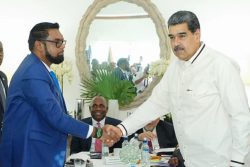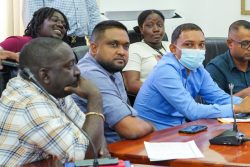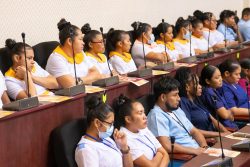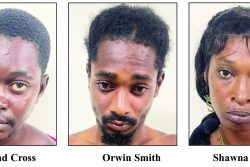 Guyana now has an annual National Poetry Slam. This represents not only an entertaining event, but an important development of a popular performance form and a significant recognition of this form as a further addition to national literature. Every year there is a competition for all performance poets, especially those involved in the genre known as Spoken Word poetry, and this competition now also includes hip-hop, which has become increasingly popular and accordingly, more relevant because of the competition.
Guyana now has an annual National Poetry Slam. This represents not only an entertaining event, but an important development of a popular performance form and a significant recognition of this form as a further addition to national literature. Every year there is a competition for all performance poets, especially those involved in the genre known as Spoken Word poetry, and this competition now also includes hip-hop, which has become increasingly popular and accordingly, more relevant because of the competition.
In this National Poetry Slam, all performance poets, spoken word poets and hip-hop artistes are invited to compete for a prize in a competition held at the 704 Club. These contestants are largely known, as they perform on a regular basis at several and various shows, concerts and dramatic events throughout the year. In this competition, they are invited to perform in the same styles and to the same audiences to which they are accustomed. But there is an important difference.
All entrants must compose lyrics according to themes and subjects that make useful contributions to national consciousness, social issues, social problems, national pride or patriotism. While there is no interference with the forms and styles naturally developing, the creations must contribute to a corpus of compositions in the genre that make up a volume of national literature aimed at problem solving or elevating national and personal consciousness.
Contestants must perform lyrics which fall under any of the following themes:
● National Pride
● Patriotism
● Burning social issues
● Societal problems
● Solving social problems
● Encouraging self-awareness,
consciousness, positive thinking.
In the previous two competitions in 2016 and 2017, there were several pieces addressing problems which have been prevalent in this society, such as suicide, sexual abuse and domestic violence among others, as well as those celebrating the Guyanese nation, personal development, and identity.
In 2016, at the inaugural contest, the National Champion was Clinton Duncan whose theme was identity, a stand against stereotyping and derogation of persons, and asserting the individual creative consciousness. The runners-up were Eden Corbin and Randolph Critchlow. In 2017, Eden Corbin returned to be the winner with a theme of violence and exploitation against women. Carlene Gill Kerr and Mark Luke Edwards were the runners-up, with Kareem Lewis as the Best Hip-Hop Performance.
The idea of the Guyana National Poetry Slam developed in 2016 in the Department of Culture while it was planning events for the nation’s Golden Jubilee – 50 years of independence. There was collaboration between the Department of Culture and the Guyana Prize for Litera-ture. The Poetry Slam was created to be staged by the National School of Theatre Arts and Drama in collaboration with the Guyana Prize.
It was to promote and develop national literature out of a popular genre and create a volume of compositions promoting nationalism, national pride and treating social issues and problems. Traditionally, the local hip-hop performances followed the American in a way that was (and still is) straight imitation with themes that were popular and fashionable. The Spoken Word Poetry developing in the country tended to be fairly similar in order to appeal to the popular audience dominated by themes of sex and styles driven by colourful, popularly delightful language.
The Guyana Prize was interested in a challenge to make these popular forms matter and to make them create meaningful national literature. It was also a way of contributing to the development of an art form that was gaining ground and large audiences, including the youth.
The artistes were challenged to influence their large and growing audiences positively. To have something meaningful to tell them that rises above the usual run of fashionable superficial recitations. They already had the audience, now they were challenged to influence them more progressively and lift their consciousness.
The idea was to go into the environment where these genres are normally performed, not to try to change what they were doing, not to interfere with popular entertainment, but to utilise it for social development and the development of a literature. The environment was one in which there were gatherings of young people, who went to be entertained by hip-hop, popular music forms and where spoken word poets performed. The idea was to go into that environment and create a new volume of literature.
For that reason, an alliance was formed with Franale’s Hip-Hop and Poetry Nights, a monthly event held at the Club 704. This was one of two known facilities where Spoken Word was regularly performed – the other being the monthly appearance of these performers at the OMG establishment run by Banks DIH.
Franale Holder was commissioned by the National School of Theatre Arts and Drama and the Guyana Prize to coordinate the National Poetry Slam within the natural environment of hip-hop performance. Her knowledge of the industry, experience, influence and leadership were assets, and the fact that she is known to both performers and audience. These were important because the idea was to influence that very environment and use that popular audience to promote positive and developmental messages. It is among those youthful people that the messages would matter.
There is an annual Poetry Slam in Trinidad and Tobago, held every year at the end of the OCM Bocas and NGL Literary Festival and Literary Prize. There are similarities and differences. The foregoing is also relevant to what has been developing worldwide as Spoken Word Poetry and poetry slams.
The notion of “literature” has been undergoing various metamorphoses over the decades. There has been gradual release from dependence on a canon – a set of classical foundation texts regarded for centuries as the best and the formal exemplars of literature. Then there was a widening of the scope of what is accepted into the mainstream of literature. To stick to the Caribbean for the moment, West Indian literature has come to include popular and folk forms, traditional forms and other related genres such as film, performance and sound recordings.
As such, forms of oral literature and popular performance have been embrac-ed. It is now not uncommon for literary studies to be done of dancehall. Chutney and soca have been pursued to a much lesser extent, but they are included. Already there are substantial studies of the calypso.
Worldwide, these trends were emphasised when Bob Dylan won the Nobel Prize for Literature. Dylan himself recognised what was happening as he pointed out in his (in absentia) Nobel Lecture. He said his award was conformation of the recognition by the mainstream of his work, which was developed for performance to live audiences, as “literature”. That is exactly what the Guyana Prize had in mind in their recognition of the Guyanese Spoken Word Poetry.
Internationally, this genre has gained ground both in Europe and the USA. In America, there have been such developments as Def Poetry and other poetry slam competitions. In Europe it has long been quite popular.
The best form of the Poetry Slam developed in Holland in the 1990s as a part of literature; it was included in the series of poetry events held by the Prince Klaus Fund in the Netherlands for many years since 2000.
The “slams” are popular events and are decidedly audience driven. They are held in bars or similar type locations. The poets perform their work and are judged by both a panel of judges and by the audience. Members of the audience give scores after each performance and the audience response is taken into consideration by the judging panel. The audience participation in the Netherlands is loud and lively, and they hold up cards with their scores out of ten.
This genre of Spoken Word is now quite entrenched in Guyana where there are many who are specialists in the form. It was also given much development assistance when the Upscale Restaurant used to have regular sessions.
The mainstream imprimatur has now been given by the Department of Culture, the Guyana Prize and the National School of Theatre Arts and Drama.








